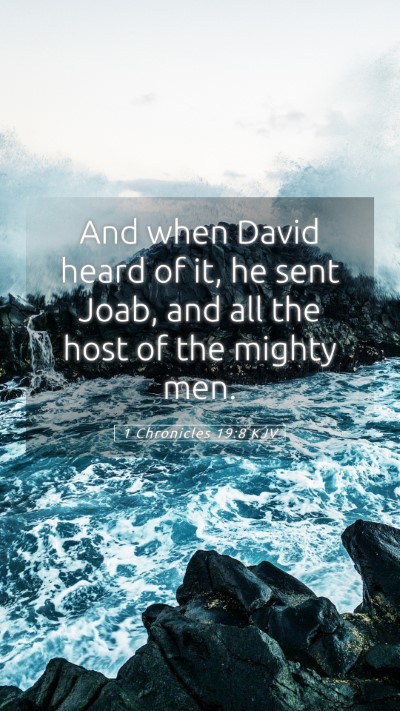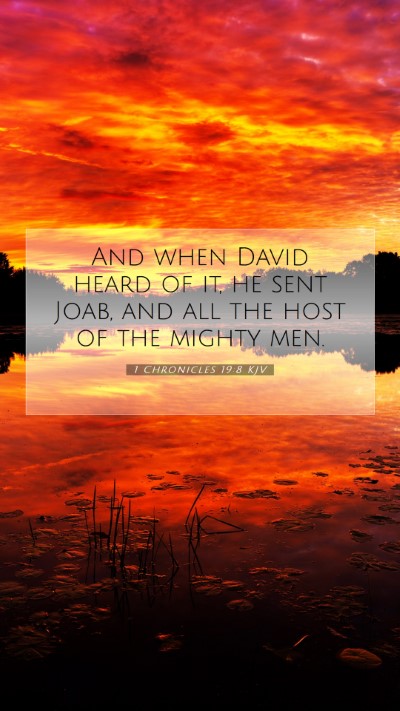Bible Verse Meaning: 1 Chronicles 19:8
Verse: "When David heard of it, he sent Joab and all the host of the mighty men." (1 Chronicles 19:8)
Understanding the Context
This verse occurs in the context of the events that follow the death of the Ammonite king Nahash. A diplomatic gesture had been made by David, sending messengers to express his condolences to Hanun, Nahash's son. However, Hanun and his advisers, suspecting ulterior motives from David, insulted the messengers and prepared for war. David's response is critical, showcasing his leadership and military strategy.
Bible Verse Interpretations
The actions of David in sending Joab, along with his mighty men, illustrate several key themes:
- Leadership and Responsibility: David’s decision to act swiftly demonstrates the importance of taking responsibility for one's kingdom and the need for protective measures in the face of potential conflict.
- Military Preparedness: By mobilizing his mighty men, David acknowledges the significance of being prepared and proactive rather than reactive in the face of threats.
- Diplomatic Relations: This incident underlines the complex dynamics of international relations in biblical times, where actions based on trust can lead to misunderstanding and conflict.
Comments from Public Domain Commentaries
Matthew Henry's Concise Commentary
Matthew Henry notes that David’s foresight in sending Joab illustrates the necessity of vigilance and readiness when faced with hostility. He remarks that this event teaches us to rely on God for wisdom in governance and warrior-like tenacity in defending our interests.
Albert Barnes' Notes on the Bible
Albert Barnes emphasizes the political implications behind Hanun's actions, suggesting that the Ammonites viewed David’s gesture as an opportunity for aggression rather than peace. David’s military response reflects his understanding of the realpolitik of the time, asserting the importance of fortifying one's position through necessary action.
Adam Clarke's Commentary
Adam Clarke focuses on the relationship dynamics depicted in this text. He stresses that David’s respect for the slain king’s memory could not outweigh the direct challenge presented by Hanun's insult. Clarke highlights how this situation evolves from a peaceful gesture to a declaration of war, illustrating human nature’s tendency toward suspicion and hostility.
Significance of 1 Chronicles 19:8
This verse serves as a pivotal point in understanding David's kingship and military strategies. It encapsulates **Bible verse meanings** relating to leadership and conflict resolution. The need for readiness in the face of provocation resonates throughout Scripture and speaks to the **application of Bible verses to daily life** as leaders and individuals navigate their responsibilities.
Related Bible Cross References
- 2 Samuel 10:1-7 - Details the same event, providing additional context about Joab's military leadership.
- Psalm 20:7 - Highlights trust in the Lord for victory, paralleling David’s reliance on divine guidance.
- 1 Samuel 8:20 - Discusses the desires of the people for a king, foreshadowing David's leadership challenges.
Conclusion
In summary, 1 Chronicles 19:8 invites readers to explore deep themes of leadership, military strategy, and international relations in the biblical narrative. This passage encourages modern-day believers to understand the historical context of **difficult Bible passages** and to apply its lessons through **Bible study tools** such as commentaries and analyses. Whether in **Bible study groups** or personal reflection, this verse fosters engagement with the text that enhances our **understanding of Scripture**.
Bible Study Resources
For further study, consider utilizing the following resources:
- Bible study guides: These can provide structured approaches to tackling biblical texts.
- Online Bible study: Engage with communities for shared insights and discussions.
- Bible study courses: Deepen your understanding through systematic theological education.


